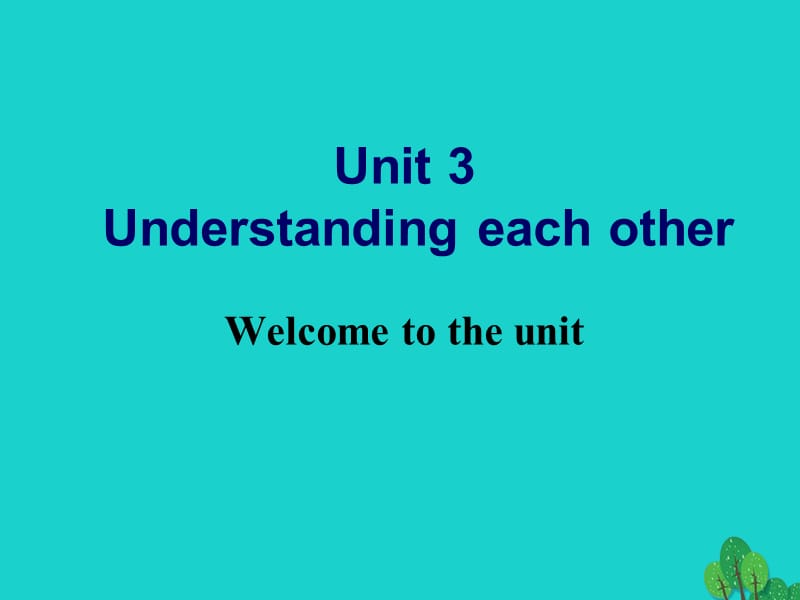《高中英語 Unit 3 Understanding each other Welcome to the unit課件 牛津版選修6》由會(huì)員分享���,可在線閱讀���,更多相關(guān)《高中英語 Unit 3 Understanding each other Welcome to the unit課件 牛津版選修6(43頁珍藏版)》請(qǐng)?jiān)谘b配圖網(wǎng)上搜索。
1���、Unit 3 Understanding each other Welcome to the unit,Objectives,To get a general idea of what we are going to learn in this unit To find out different ways of greeting in different countries To learn to discuss different ways of greeting,,,,11月21日是“世界問候日”,對(duì)于每個(gè)人來說這都是一個(gè)溫馨的節(jié)日�����,我們需要做得很簡(jiǎn)單�����,只要對(duì)遇到的人發(fā)出真摯的問候�,或是
2�����、傳遞一個(gè)甜美的微笑���,就會(huì)把快樂帶給整個(gè)世界����。這個(gè)溫馨浪漫的節(jié)日,讓城市中忙碌的人們感受到別人的關(guān)懷���。,世界 問候日,various ways of greeting,call,text messages,smile,send flowers,shake hands,hug,wave,kiss,E-mail,Brainstorming,,bow,,,,,,,,,,,,Ask students to show some different ways of greeting each other.,Warming-up,How do people usually greet each other?
3��、 --- saying “ Hello” --- patting on the back --- waving hands --- nodding heads --- sounding the horns --- and so on.,People from different countries have different ways of greeting each other. Look at the following pictures.,Chinese / American way,Arabian way,Japanese way,Dutch way,South
4����、American way,Ways of greetings in foreign countries,4,When people from the Netherlands meet, they kiss each other on one cheek and then the other. If you are a close friend or relative, then you get three kisses!,Look at the pictures on Page 33, and read the captions (說明) under them.,Can you match t
5���、he ways of greeting with the countries?,1.The Netherlands,a. putting their hands together and bowing slightly,2. Thailand,b. kissing each other on one cheek and then the other,c. greeting each other by touching noses,3. South America,d. hugging each other,4. The Middle East,,,,,1. Are these ways
6、of greeting the same as the ways Chinese people greet each other? 2. What would you think if you saw Chinese people doing these in China? 3. If someone greets you in these ways, what will you do then?,Questions,Do you know of any other ways of greeting around the world?,Discussion,Discussion,Why do
7�、people in different countries greet each other in different ways?,There are various reasons for different ways of greeting in different countries:,different cultures different greetings towards different people (eg. to peers or to superiors) different living environment different values ,Can you th
8、ink of any other customs that are different in different parts of the world?,Discussion,Lets enjoy the video.,Keep to the left,Keep to the right,Japan, India, England, New Zealand, Australia, Thailand, Singapore,China, America, Brazil, Canada, Germany,Traffic rules,numbers,countries,meaning,4,China,
9�����、 Korea,bad luck, death,Thailand,favor 好感,,affection 友愛,Arab,a long life,6,Japan,useless person,8,Singapore,unlucky,Numbers,1. What about an Arab and a Japanese meeting for the first time?,Pair work,2. As a Chinese, if you are not familiar with the ways of greetings in other countries, what might hap
10�、pen?,Maybe we would feel embarrassed; we might be involved in awkward situations like,Table manners,What differences are there between China and western countries about table manners? Should we offer more food to our foreign guests when they are full?,Whats the common topic when western people firs
11、t meet? 2. Do you know the meanings of the okay sign in different countries?,Further thinking,3. Do you know the history of shaking hands?,Back in the ancient times, it was meant to let others know there were no weapons in your hands. They held out hands to be touched by the opposite to ensure saf
12����、ety.,Language points,1. below,(1) adv. 在或向較低處�,較低位置,the valley below,下面的山谷,(2) adv. (數(shù)量�����、年齡���、價(jià)格)以下,(4) adv. 在較低級(jí)別 上尉以下的軍官 captain below,children below 3,三歲以下的孩子,(3) adv. 零下 零下10 10below,注:below 也可以作介詞����,意思同上��。,2. following,(1) adj. next (to be mentioned) 隨后的,The child was sick in the evening, but on th
13��、e following day he seemed well again.,這個(gè)孩子晚上生病了,但第二天似乎又好了����。,the following afternoon/month/page/ chapter/example/way,(2) prep. after an event or as a result of 在之后;由于,Following the speech, there will be a few minutes for questions.,演講之后�����,將會(huì)有幾分鐘的時(shí)間提問題��。,由于內(nèi)戰(zhàn)爆發(fā),數(shù)以千計(jì)的難民離開了該國(guó)。,Thousands of refugees left th
14�����、e country following the outbreak of civil war.,(3) n. C a group of people who support or admire sb 追隨者,這支樂隊(duì)在中國(guó)有一大批崇拜者����。 The band has a big following in China.,the following: the people or thing that you are going to mention 下列的人/事物,3. touch: V. T,(1) be or come together with sth. else so that there
15、 is no space between 接觸,觸及,One of the branches was touching the water.,其中的一根樹枝觸及水面����。,(2) make sympathetic or sad 感動(dòng)(某人); 觸動(dòng)(某人的感情),We were all deeply touched by his tragic experience.,我們都被他的悲劇性的經(jīng)歷深深地打動(dòng)了。,touch 用作名詞的相關(guān)短語:,get in touch with 與取得聯(lián)系 keep in touch with 與保持聯(lián)系 lose touch with 與失去聯(lián)系 out of touch with 與不聯(lián)系,Homework,1. Search more information about different ways of greeting and some unique customs in some countries.,2. Write your search into a short passage.,,,,Thank you !,
 高中英語 Unit 3 Understanding each other Welcome to the unit課件 牛津版選修6
高中英語 Unit 3 Understanding each other Welcome to the unit課件 牛津版選修6

